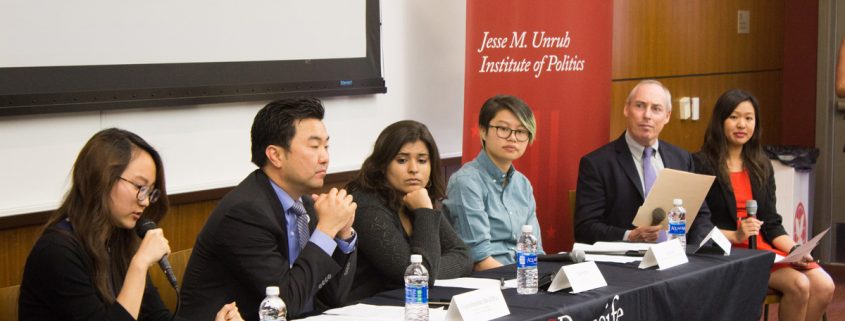Panel analyzes the Asian American vote in elections
The Jesse M. Unruh Institute of Politics and the Asian Pacific American Student Assembly hosted the Institute’s fourth and final installment in the “It’s Our Election Too” series Wednesday. Moderators included Unruh Institute Director Dan Schnur and APASA External Community Chair Amy Chau. Panelists included L.A. Councilmember David Ryu, Voting Coordinator at the L.A. branch of Asian Americans Advancing Justice Shelly Chen, and, Sarah Kim, APASA Finance Director, and Aliza Khan, a junior majoring in economics.
Ryu was the first Korean American and only the second Asian American to be elected to municipal office in Los Angeles. Representing the Fourth District, stretching from Sherman Oaks to Koreatown, Ryu was elected with strong support from the Korean community in and around his district. He discussed his campaign with the panel and the similarities to the national election.
“If you look at my [City Council] election, it’s just a microcosm of what’s going to happen in the macro,” Ryu said.
While Ryu ran in a crowded non-partisan primary for City Council with 13 opponents, he and defeated front-runner Carolyn Ramsay, former chief-of-staff to then-incumbent Councilmember Tom LaBonge in the general election.
The panel also touched on the importance of Asian Americans actually turning out to participate in the elections that elect their representatives.
Kim noted that Asian Americans may be skeptical of participating in American politics because of their associations with politics back home or may simply have little motivation to do so.
“A lot of older generations feel that — even though they have become citizens in recent years — they feel more plugged in back at home, whether that be China, or Korea or Vietnam, and they don’t believe that they should participate here [in U.S. elections],” Kim said.
Chen spoke on her work with Asian Americans Advancing Justice, dealing with challenges of getting Asian voters to turn out and participate on Election Day. AAAJ is an advocacy organization that works on behalf of Asian Americans to organize on issues such as race relations and domestic violence.
“Our [Asian] communities are disproportionately immigrant and relatively limited-English-speaking, and so what that means is that many folks face barriers when it comes to the voting process,” Chen said. “Particularly when it comes to language, many voters don’t know the resources that are available to them.”
When questioned about the possible influence the Asian-American community could have on future elections through its traditional view as a swing voter block, both Chen and Kim pointed out that many Asian Americans vote regarding issue positions and less by party.
In her response, Kim noted that in past presidential elections, Asian Americans cast as many as 74 percent of their votes for Democrats. However, twenty years into the past, just as high a percentage voted for Republican candidates.
Chen, however, noted that Asian Americans are often ignored because they aren’t widely considered to be reliable partisan voters.
“A lot of folks in our [Asian Pacific American] community are unaffiliated,” Chen pointed out. “What happens, sometimes to our detriment, is that our community is ignored by those mainstream candidates.”
Finally, Ryu addressed the students by discussing how he used “people power” to overcome the odds against him in his election for City Council.
“They said ‘it’s not our turn [to have a Korean councilman],’” Ryu said. “See, in politics, power is not given. It’s taken.”

